Exactly 50 years ago today, Medicare and Medicaid were signed into law. But like twins separated at birth, the two programs have diverged and now occupy a very different status in our communities.
Medicare, the federal health insurance program for the elderly and disabled, is now one of the most popular programs in the nation. Hard to believe that in 1961, Ronald Reagan famously said, "If you don't [stop Medicare] and I don't do it, one of these days you and I are going to spend our sunset years telling our children and our children's children what it once was like in America when men were free."
We've come a long way since then. Medicare now covers more than 50 million Americans. This exemplar of single payer national health insurance is so deeply woven into the fabric of our society that politicians attack it at their own peril.
Medicaid, known as Medi-Cal here in California, is a different story. A health insurance program for poor people, it's jointly funded by federal and state governments, so looks different in every state. It's also technically an optional program. It took 17 years after its inception before the last state threw in the towel and decided to participate.
Despite the fact that Medicaid now insures one in five Americans -- and nearly one in three in California -- public support is far from universal. Obamacare allowed states to dramatically expand Medicaid, but refusing to expand has become a political litmus test on the right.
